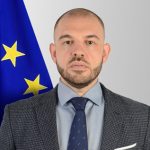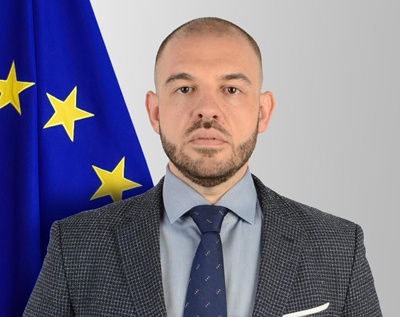 EU Ambassador Cristian Tudor
EU Ambassador Cristian TudorKUWAIT: The European Union's Ambassador to Kuwait and Qatar Cristian Tudor spoke in an interview with Kuwait Times on an array of topics highlighting the EU's role in promoting peace around the world, with a special focus on the Middle East. The following are excerpts from the interview, which was conducted on the occasion of the 'International Day of Peace'.
Question: Why is the EU referred to as the most important peace project in the world?
Tudor: The preservation of peace is the very reason the European Union was born in 1950, after the devastation of two world wars. Since then, the EU has maintained peace for over 70 years. This brought prosperity, stability and better living standards for EU citizens.
The EU has played an important role in transforming Europe from a continent of war to a continent of peace and prosperity. The ability of the EU to bring peace and stability make the EU an attractive project for more European countries to join. What started as a project of six countries is now a union of 27 EU member states. The EU was awarded the 'Nobel Peace Prize in 2012' in recognition of the EU's efforts to advance the causes of peace, reconciliation, democracy, and human rights - not only in Europe, but also across the globe.
Question: How is the EU promoting peace in the world?
Tudor: The EU is a global player, working with the international community to promote global peace and security, and defend fundamental rights and international law. Our commitment to peace is also reflected in our active role in promoting multilateralism and rules-based order at the world level, for instance in the framework of the UN system. The EU has been and will continue to be the best ally of multilateralism and its institutions, because the world we live in is interconnected and we need to shape global responses to global challenges.
The EU aims to integrate the pursuit of peace in its external actions in areas such as trade, development, enlargement and neighborhood policies, its common foreign and security policy, and political and diplomatic relations with third countries and multilateral institutions. The EU has established a reputation as a soft power organization guided by a normative vision and as an effective actor for peace and democracy.
The EU is a unique actor in integrating civilian and military means to advance peace worldwide. The EU have various initiatives in the security field in the MENA and Gulf region in particular. The EU currently has 17 civilian and military missions and operations in countries outside the EU, including those in the Middle East.
Question: What is the EU doing to promote peace in the region?
Tudor: The EU is actively involved in efforts to advance peace and stability in the Middle East by using a variety of civilian and military instruments. When it comes to civilian means the EU and its member states are for instance leading donors of international aid to the Palestinians and those affected by the conflict in Syria.
Another example of the EU efforts to promote peace in the region is the European Union Naval Force Mediterranean operation. This is EU Common Security and Defense Policy Operation in the Mediterranean focused on the implementation of the United Nation arms embargo on Libya. EU contributes also to stability of Iraq, where it has an EU Advisory Mission that advises the Iraqi authorities on their implementation of civilian security sector reform.
The EU has a Special Representative for the Middle East Peace Process whose mandate is to provide an active contribution to the final settlement of the Middle East conflict. The EU and Kuwait share a common interest in bringing more stability to the region through peaceful means. The EU has been fully supporting Kuwait's mediation efforts with regard to the Gulf rift that brought the dispute to the end. Peace should be not taken for granted and we all should work towards this common goal.











